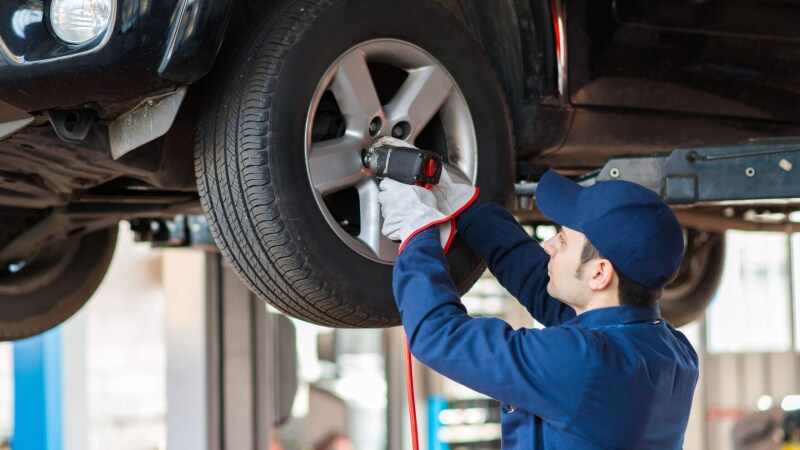How much does a tire rotation cost

For many car owners, tire rotation is at the very bottom of their maintenance checklist. But it’s one of the simplest, yet most critical maintenance activities. After all, no matter how great the condition of your vehicle, if the tires are in bad shape, your car might not perform at the intended level.
One reason for ignoring tire maintenance is the fear of mounting car ownership costs. These expenses can add up to a sizeable amount over time, but they're crucial for keeping your vehicle in good shape. With that in mind, how much does a tire rotation cost? And does your car really need it? In this article, we're going to help you find the answers.
What is tire rotation, and why is it important?
In simple terms, a tire rotation involves switching your vehicle's four tires. This is essential since tires usually wear unevenly because of the different levels and types of stress they endure at each wheel. For example, in front-wheel drive vehicles, front tires typically wear out faster than the rear ones. And if you’re frequently taking sharp right turns, it could put extra stress on your left front tire.
By rotating tires regularly, you can help achieve similar wear on all four tires over time. It alternates the levels of stress so that one tire doesn't get worse than the others. Ideally, this should prevent you from needing to replace your tires more often because they'll all be wearing down evenly.
Rotating your tires on a regular basis can also reduce the strain on drive components and provide better traction and handling when you're making those sharp turns or stepping on your brakes to come to a sudden halt. Therefore, in the long-term, tire rotations may yield significant cost savings when it comes to tire replacements and general maintenance. Having your tires rotated could even improve the vehicle’s overall performance and provide better fuel efficiency. This means you may save money at the gas station, too.
In many cases, it might be a mandatory requirement for tire warranties to remain valid, so you'll have to do it if you want to keep your tires covered. But most importantly, it could improve road safety for you and your loved ones. That's something you should never leave to chance.
How often should you rotate your tires?
Mechanics typically recommend a tire rotation every 5,000 to 8,000 miles, check your owner's manual for the manufacturer’s recommendations. That’s around every six to 12 months, but this could depend on several factors. For example, the tire rotation frequency could vary based on your car’s make and model. If you’re using a newly bought vehicle, then the owner’s manual can guide you on this.
A car that undergoes rough handling may also need more frequent tire rotations. The weight of the vehicle could have a say in this, too. And a new set of tires usually require a rotation sooner. This is because uneven tread wear would be more pronounced on new tires than on their older counterparts.
You can also gauge uneven tire wear on your own with a visual inspection. If you haven’t rotated the tires in a while, you may notice different levels of tread wear on each tire. Also, watch out for frequently low tire pressure on one or two tires or a vibration when you’re driving at higher speeds. All these could signal that it’s high time for a tire rotation.
If in doubt, speak to a qualified mechanic for advice on when you should rotate your tires.
How much is a tire rotation?
Generally, a tire rotation could cost somewhere between $24 to $50. But sometimes, it could even go up to $120. What you pay might depend on where you go and what other services you get.
Some car owners who are looking to cut down on maintenance costs may choose to perform this task on their own, but it’s usually best to hire a qualified mechanic. Taking your car to a professional could give you an opportunity to get a quick visual inspection done by an expert.
For instance, they could check for uneven tread wear on the inside and outside parts of a tire, which may mean a more serious issue that requires attention. Your mechanic could also advise you on the best tire rotation pattern for the car. This would depend on several factors such as your vehicle and tire type.
Tire maintenance: a few essential tips
At the end of the day, tire rotation costs should not prevent you from getting your tire maintenance work done on time. The benefits of having this service performed regularly usually outweigh the cost. If you find your mechanic’s quote to be on the high side, don’t be afraid to shop around and find somewhere more affordable.
Here are a few other tips to keep in mind when thinking about tire rotation:
- Prepare a maintenance checklist and include tire rotations based on the frequency recommended in the owner’s manual or as advised by your mechanic.
- If you’re planning on purchasing a new set of tires, check whether it includes free rotation services. Some sellers offer complimentary tire rotations during the warranty period. This could help you save up on the cost.
- Always check the tire condition when buying a car. Worn-out tires could need a replacement soon after purchase. And uneven wear might signal that the car hasn't gone through regular maintenance. Understanding these could help you negotiate a better deal.
- When planning to finance a new car, remember to factor in tire maintenance under ownership costs. Although it’s a small expense, it would still add to your total costs of ownership in the long-term.
Unlike an oil change or a brake disc service, you may not encounter immediate troubles if you forget to schedule a tire rotation. But the consequences of continuing to neglect it could be costly, not just financially, but also in terms of safety. Remember, the performance of your entire car may ride on your tires, quite literally. So, regular tire rotation and maintenance should not be just an afterthought.



